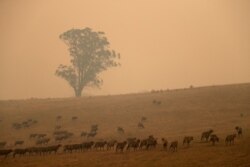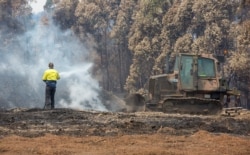As the sky darkened and the smoke billowed through the village, it seemed to those hunkering at the fire station that "The Beast" would finally roar through. But the wildfire only crept closer, prodding forward a few tentative fingers before falling asleep again as the winds died.
The weary volunteer firefighters of Burragate returned to bed early Saturday after a week of worry and false alarms. Many have had enough. If the fire is going to burn through their southeast Australian town, they say, then they want it to get on with the job so they can start cleaning up.
"I'd prefer it not to come, but if it's going to come, stop teasing," said resident Joe Seamons, who has taken to describing what's officially called the Border Fire as "The Beast."
Resident Joe Alvaro put it more bluntly. "I just want to get it bloody over and done with," he said.
Across Australia, wildfires have killed at least 27 people, including a firefighter on Saturday, and burned down more than 2,000 homes since September. They have focused international attention on climate change and caused political problems for Prime Minister Scott Morrison, who has been criticized for his lackluster response.
The wildfires have lurked near Burragate for over a week, filling the sky with noxious smoke that is burning people's eyes and making them cough. The sun has turned red and distant hills have disappeared behind a shroud of haze.
The village in New South Wales is tiny, with about 100 residents, according to the latest census, although some locals say there are fewer than half that. With no shops or bars, the fire station has become the focal point for the community. Sometimes they hold movie nights there. On Friday, the station was filled with stacks of donated goods, more carrots and toothbrushes than people knew what to do with.
On Friday night, with strong winds expected to make the fire flare up, a convoy of trucks — including some from the army and others carrying a strike team of volunteer firefighters — rolled into town. At one point, more than 30 people were at the station, hoping to save lives and homes but prepared to retreat inside if the flames were too intense.
Among them was Bill King, an operations section chief from the U.S. Forest Service in Colorado. He's part of a reciprocal arrangement in which more than 250 Americans are being posted to Australia to help battle the blazes. He's also the dad of a 3-month-old daughter, and jokes that he's sleeping better on his assignment.
As some of the convoy moved on to other towns, the local volunteers remained, drinking espresso made from an overworked machine and poring over maps.
Seamons, who is retired, said he and his wife moved to Burragate because they didn't want to live in a crowded town any longer. But he said their lifestyle has been affected by three years of drought, with his garden plants dying and his apple trees not producing any fruit.
Lately he's taken to sitting inside with the fan going to get away from the smoke. Some places in Australia have recorded air quality worse than in New Delhi or Beijing as a result of the fires. Seamons said he has had enough of The Beast.
"Hopefully it gets sick of hanging around Burragate," he said. "But I don't wish it on anyone else, either."
Alvaro said that on Friday, he was ready for the fire.
"When I saw the smoke and everything, I was relieved," he said. "I thought, come and get it."
But now he's hoping that with favorable weather forecast for the next week, fire crews will finally be able to move from playing defense against the fires to attacking them. He said he just hopes he doesn't have to go through the stress of another night on high alert.
And if the fire does come, he said, he's going to fight it all the way.
“We're a pretty close-knit community. There are some beautiful people here,” Alvaro said. “So it's worth protecting.”






